Full Length Research Paper
ABSTRACT
The impact of Physics laboratory on students was carried out among senior secondary school students offering Physics in Ethiope West Local Government Area of Delta State using descriptive survey. Five public schools were random-even samplying technique was adopted for precision. Fifty questionnaires were distributed to students in each school, making it a total of 250 students in all schools and retrieved immediately to avoid alteration of information. Percentage analysis was to evaluate the collected data. The findings revealed that physics laboratory helps in the teaching of physics students in senior secondary schools, in Ethiope West L.G.A. of Delta State, because 80.4% of the respondents agreed to the statement while 19.6% disagreed. Also, 87.2% accepted that physics practical improve learning that stimulate positive impact while 12.8% disagreed. 92.2%, 75.9% and 88.3% agreed while 7.8%, 24.1% and 11.7% disagreed with the statements; there is a significant relationship between students and teachers during experimental classes, physics laboratory helps to inculcate scientific reasoning among physics students and physics laboratory enhances students’ performance in physics in senior secondary schools in Ethiope West L.G.A. of Delta State respectively.
Key words: Physics, laboratory, positive impact, scientific reasoning, Ethiope West.
INTRODUCTION
Science is the tap root upon which the bulk of present day technological breakthrough is built. All over the world, nations including Nigeria are striving hard to develop technologically and scientifically, since the world is turning scientific and all the proper functioning of lives depend greatly on science. Ogunleye (2000) observed that science is a dynamic human activity concern with understanding the working of our world. Owolabi (2004) defined science as an integral part of human society. Its impact is felt in every sphere of human life, so much that it is intricately linked with a nation’s development. Science as a field of study is divided into other discipline such as Physics, Chemistry and Biology.
Physics as one of the branches of science is one of the science subjects in the secondary school curriculum, like other subjects, it performs some vital roles which help in the achievement of some national goals. In fact, physics is the basic science subject that deals with those
fundamental questions on the structure of matter and interaction of elementary constituents of nature that are susceptible to experimental investigation and theoretically inquiry.
Physics as one of the science subject has remained one of the most difficult subject in the school curriculum (NERDC, 2004). A study by Owolabi (2004) revealed that the performance of Nigeria student in ordinary level Physics was generally poor, which he attributed to many factors including teaching strategy; it was consider as an important factor. Jegede et al. (1992) reported factors responsible for student general poor performance in Physics as; poor laboratory facilities, inability of the phy-sics teacher to put across ideas clearly to the students and inadequate numbers of learning facilities in school as against consistent increase in the number of students.
Physics as a science subject is activity oriented and the suggested method for teaching it which is guided discovery method is resource base (NTI, 2007). This suggests that the mastery of physics concepts cannot be fully achieved without the use of the laboratory. The teaching of physics without learning materials (laboratory equipment), will certainly result to poor performance in the subject.
The laboratory consists of various tools and equipment used by scientists/science students either for the finding of new knowledge or to ascertain previous findings. Physics laboratory is a place where different types of experiment and researches concerning all the discipline of physics take place. Physics laboratory has been described as a room or a building specially built for teaching by demonstration of theoretical phenomenon into practical terms. Laboratories have been found to be the scientist workshops where practical activities are conducted to enhance a meaningful learning of science concept and theories (Seweje, 2000; Oluber and Unyimadu, 2001). They have also been found to be a primary vehicle for promoting formal reasoning skill and students understanding, thereby enhancing desired learning out come in students (Ogunleye, 2002).
The laboratory has helped in increasing the perfor-mance of students in learning and understanding the subject physics. Beside, researchers have found science laboratories to be central to the teaching of physics in secondary schools that is why we have to consider this work “The Impact of physics Laboratory on students offering physics in Ethiope West Local Government Area of Delta State”.
STATEMENT OF THE PROBLEM
Throughout the years, developing countries performance in physics among Senior Secondary School students has not being encouraging hence thorough investigation into the factors that could be responsible for the poor performance of students in physics need to be conducted.
To guide the study, some questions need to be asked in order to have a critical look at the Impact of Physics Laboratory on Students Offering physics in Ethiope West L.G.A. of Delta State
Purpose of the study
The purpose of the research study is to identify the factors that affect students’ performance in physics among senior secondary school students in Ethiope West Local Government area of Delta State.
1. To improve learning that stimulates positive impact towards the study of physics in Ethiope West L.G.A of Delta State.
2. To inculcate scientific reasoning among Physics students in Ethiope West L.G.A of Delta State.
3. To build a relationship between students and Physics teachers during lesson in Ethiope West L.G.A of Delta State.
4. Most importantly to enhance performance in Physics, among Senior Secondary School students in Ethiope West L.G.A of Delta State.
Significance of the study
The findings from this study will pre-informed and post inform counselors, teachers curriculum planners, school administrators and the government, the problem facing student in the study of Physics. This would enable them take quick actions in view of this problem that has emanated. Parents/ Guardians would also get to know the problem encountered by their children and help them to correct these challenges. Hopefully the students would come out successfully in their various schools examination in physics.
Research question
1. Does physics laboratory help in the teaching of Physics in senior secondary school in Ethiope West L.G.A of Delta State?
2. Does physics practicals improve learning that stimulates positive impact towards the study of physics in Ethiope West L.G.A of Delta State?
3. Is there any significant relationship between students and teachers during physics practical classes in Ethiope West L.G.A of Delta State?
4. Does physics laboratory helps to inculcate scientific reasoning among physics students in Ethiope West L.G.A of Delta State?
5. Does physics laboratory enhance the students’ performance in physics, in Ethiope West L.G.A of Delta State?
Scope of the study
This research work is the impact of laboratory equipment on student performance in physics among secondary school students in Ethiope West Local Government area of Delta State, is restricted to only five secondary schools in the L.G.A.
METHODOLOGY
The research design, population of the study, sample and sampling techniques, research instrument, validity of the instrument, method of data collection and method of data analysis will be discuss below:
Research design
The design of the study is descriptive survey, because it is only interested in describing and collecting data on facts about “The impact of physics laboratory on students offering physics in Ethiope West Ethiope West L.G.A of Delta State in Nigeria”.
Population of the study
The population of the study consists of five public secondary schools in Ethiope West L.G.A of Delta State with 2500 numbers of students.
Sample and sampling techniques
The simple was drawn from five (5) secondary schools in Ethiope West Local Government Area. A total of Two hundred and fifty (250) students were randomly selected from the five (5). The five (5) schools were selected for an even spread.
Research Instrument
The research instrument used for the study was structured students questionnaire (SSQ). The questionnaire consists of 18 items constructed on a two point scare. “YES” or “NO”. It was divided into section A and B.
Section A dealt with background information: the name of the school, Age, Sex and the present class.
Section B solicited for the information on the “The Impact of physics laboratory on students offering physics as a subject”. The questionnaire designed with 18 items covering all areas of how physics laboratory contributes to the learning of physics among secondary schools students.
Validity of the Instrument (SSQ)
The instrument was validated by experts in physics who ascertain whether the questions were relevant, clear and unambiguous, and also if the items were sufficiently inclusive of major factor that lead to the effective “Impact of physics laboratory on student offering physics in senior secondary school in Ethiope West L.G.A.
Method of data collection
The questionnaire was distributed by the researcher to the students (respondents) in the selected senior secondary schools in Ethiope West L.G.A of Delta State. The questionnaire was administered to them to tick their responses and they were also collected immediately to avoid alteration. Two hundred and fifty questionnaires were administrated and recovered.
Method of data analysis
The response to the items posed in the questionnaire were collected and tabulated with regards to the response from each school, in order to answer each research question. In the analysis of the data collected simple percentage was used.
RESULTS AND DISCUSSION
This section is concerned with the analysis of data collected from the five senior secondary schools. The summary tables show the results of the analysis, while all the calculations leading to the results are in the appendices section of this work.
Data analysis and presentation of results
Research questions 1
Does physics laboratory help in the teaching of physics in senior secondary school in Ethiope West L.G.A of Delta State?
The responses used in analyzing this research questions are item 1, 2, 3 and 4 of the students’ questionnaire. The responses of the five secondary schools are shown in Table 1.
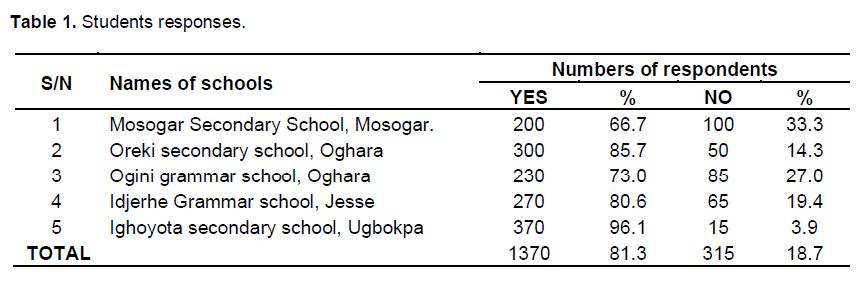
Research question 2
Does physics practical improve learning that stimulates positive impact towards the study of physics in Ethiope West L.G.A. of Delta State?
The responses used in analysing this research question are item 5, 6, and 7 of the students’ questionnaire. The responses of the five secondary schools are shown in Table 2.
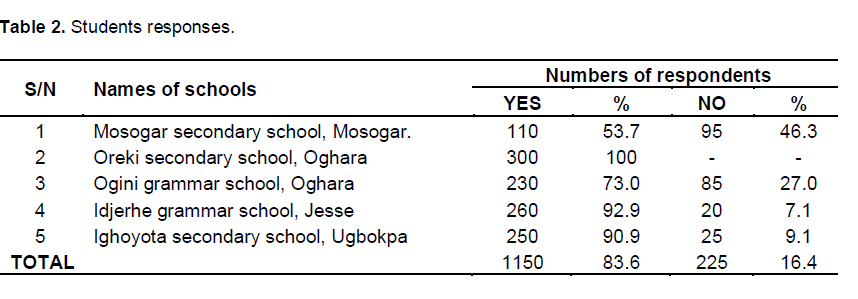
Research question 3
Is there any significant relationship between students and teachers during Physics practical classes in Ethiope West L.G.A. of Delta State?
This responses used in analyzing this research question are item 8, 9, 10, 11 of the students questionnaire. The responses of the five secondary schools are shown in Table 3.
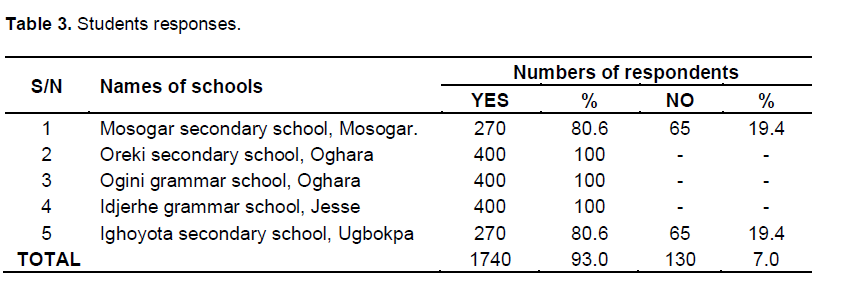
Research question 4
Does physics laboratory helps to inculcate scientific reasoning among Physics students in Ethiope West Local Government area of Delta State?
The responses used in analyzing this research question are items 12, 13, 14, and 15 of the students’ question-naire. The responses of the five secondary schools are
shown Table 4.
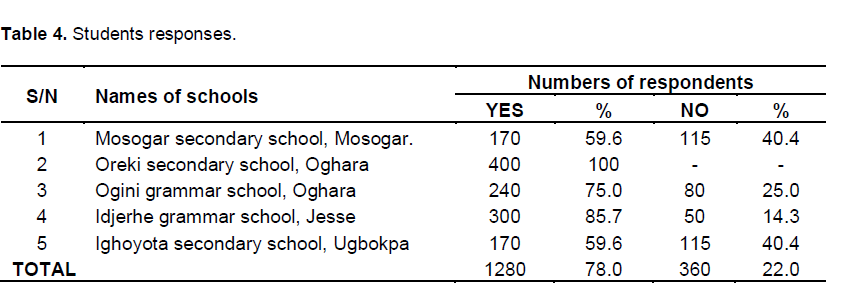
Research question 5
Does physics laboratory enhance the students’ performance in physics in Ethiope West Local Government area of Delta State?
The responses used in the analyzing this research questions are item 16, 17, and 18. The responses of the five secondary schools are shown Table 5.
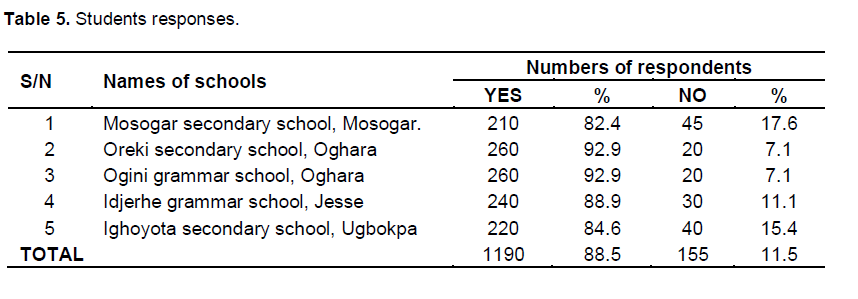
DISCUSSION OF FINDINGS
Does physics laboratory help in the teaching of physics in senior secondary school in Ethiope West Local Government area of Delta State?
The findings in the Table1 revealed that physics laboratory helps in the teaching of physics students in senior secondary schools, in Ethiope local government area of Delta State, because 80.4% of the respondents agreed to the statement while 19.6% disagreed to the statement which is in consonance with Tatli (2009) whose findings that laboratory equipment reduces or eliminate individual difference in a way, because all equipment and methods used in doing experiment in laboratory studies are also elements of individual training.
Does physics practical improve learning that stimulates positive impact towards the study of physics in Ethiope West L.G.A of Delta State?
Table 2 revealed that Physics practical improve learning that stimulate positive impact towards the study of physics among students’ in senior secondary schools, because 87.2% agreed with the statement while 12.8% disagreed with the statement. This can also be related with the work of Kallats (2001) that sees practical work as a means to verify a science principle or theory already known to the students.
Is there any significant relationship between students and teachers during Physics practical classes in Ethiope West L.G.A of Delta State?
From Table 3, 92.2% agreed and 7.76% disagreed with the statement that there is a significant relationship between students and teachers during experimental classes. The result reveals that there is significant relationship as compared with the work of Huan et al. (2001), which state that the laws of physics are founded on experiment and that experiment are an integral part of physics education and it takes a great deal of effort to pursue students to be more enthusiastic towards laboratory learning.
Does physics laboratory helps to inculcate scientific reasoning among physics students in Ethiope West L.G.A. of Delta State?
Table 4 reveals that physics laboratory helps to inculcate scientific reasoning among physics students in senior secondary schools, as the results show that 75.9% agreed, while 24.0% disagreed with the statement that physics laboratory helps to inculcate scientific reasoning among physics students. Vilay and Popou (2008) stated also that practical activities enhance the understanding of physics theory and phenomena.
Does physics laboratory enhance the students’ performance in Physics, in Ethiope West L.G.A. of Delta State?
The finding in Table 5 reveals that physics laboratory enhances students’ performance in physics in senior secondary schools, in Ethiope West L.G.A., the table discloses that 88.3% are in agreement while 11.7% opposed the statement. This also helps to authenticate the works of Adam (1988) and Mustapha (2002) which state the importance of practical activities in school, that provides learners with the opportunities to use scientific equipment to develop basic manipulative skills and practice investigative or inquiry activities and develop problem solving attitudes needed for future work in science.
CONCLUSION
Based on the finding of the study, the following conclusions are drawn.
- The non availability of laboratory equipment has great effect on the performance level of students’ in schools.
- Students’ interests or motivation for the subject is affected by the numbers of practical classes they are exposed to, per week.
- Students’ acquisition of skills is enhanced by their participation in practical classes.
- There are inadequate laboratory equipment in most of the secondary schools in Ethiope west L.G.A.
CONFLICT OF INTERESTS
The author(s) have not declared any conflict of interests.
REFERENCES
|
Huan A, Haur SC, Biaowen (2001). A new Approach to teaching practical physics. |
|
|
|
|
|
Jegede OJ, Okota OE, Eniayeju PA (1992) Raising the Standard of Performance in Public Examination in Science, Technology and STAN Position Paper N. 4 |
|
|
|
|
|
Kallats M (2001). Strategies for effective science instruction in the 21st century: The Nigeria situation. Lafiagi J. Sci. Educ. 3(182):218-224. |
|
|
|
|
|
Mustapha MT (2002). Integrated Science lectures perception of practical NERDC, 2005. Workshop on difficult concepts physics group report. Nigerian Educational Research and Development Council, Lagos. |
|
|
|
|
|
NTI (2007). Manual for the Re-training of primary school Teachers. Basic science and Technology. National Teachers institute Kaduna. |
|
|
|
|
|
Ogunleye GO (2000). Toward the optimal Utilization and management of resources for the effective teaching and learning of physics in schools. Proceedings of the 41st Annual conference of the Science Teacher Association of Nigeria (STAN 100), University of Lagos, Nigeria, pp 215-220. |
|
|
|
|
|
Ogunleye GO (2002). Documentation and Record keeping in secondary schools science laboratories; the case of Ado-Ekiti. In: Topical issues in research and education. Ado-Ekiti, Akinlua |
|
|
|
|
|
Olubor RO, Unyimadu S (2001). Management Demand for the Universal Basic Education Programme in current issues in Educational Management in Nigeria Association for Education Administration and Planning (NAEAP). pp: 48-59. |
|
|
|
|
|
Owolabi T (2004). A diagnosis of students' difficulties in physics. Educ. perspectives, 7:15-20. |
|
|
|
|
|
Seweje RO (2000). The challenge of science teaching in Nigeria today. J. Educ. Foundation management 1:216-217. |
|
|
|
|
|
Tatli ZH (2009). Computer based education: online learning and teaching facilities. Energy Educ sci Technol part B 171-181. |
|
|
|
|
|
Vilay thong T, Popou O (2008, October). The situation with practical work in physics Education in Laos's paper for xiii LOSTE symposium. |
|
Copyright © 2024 Author(s) retain the copyright of this article.
This article is published under the terms of the Creative Commons Attribution License 4.0